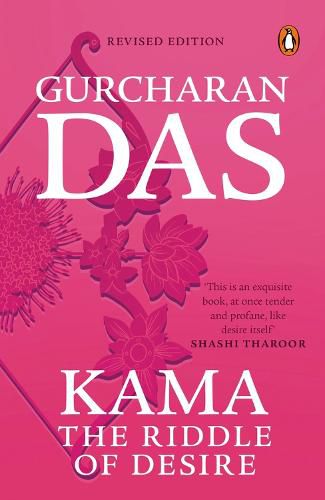Readings Newsletter
Become a Readings Member to make your shopping experience even easier.
Sign in or sign up for free!
You’re not far away from qualifying for FREE standard shipping within Australia
You’ve qualified for FREE standard shipping within Australia
The cart is loading…






A riveting account of love and desire India is the only civilization to elevate kama -desire and pleasure-to a goal of life. Kama is both cosmic and human energy, which animates life and holds it in place. Gurcharan Das weaves a compelling narrative soaked in philosophical, historical and literary ideas in the third volume of his trilogy on life’s goals: India Unbound was the first, on artha , ‘material well-being’; and The Difficulty of Being Good was the second, on dharma, ‘moral well-being’. Here, in his magnificent prose, he examines how to cherish desire in order to live a rich, flourishing life, arguing that if dharma is a duty to another, kama is a duty to oneself. It sheds new light on love, marriage, family, adultery and jealousy as it wrestles with questions such as these: How to nurture desire without harming others or oneself? Are the erotic and the ascetic two aspects of our same human nature? What is the relationship between romantic love and bhakti, the love of god?
$9.00 standard shipping within Australia
FREE standard shipping within Australia for orders over $100.00
Express & International shipping calculated at checkout
A riveting account of love and desire India is the only civilization to elevate kama -desire and pleasure-to a goal of life. Kama is both cosmic and human energy, which animates life and holds it in place. Gurcharan Das weaves a compelling narrative soaked in philosophical, historical and literary ideas in the third volume of his trilogy on life’s goals: India Unbound was the first, on artha , ‘material well-being’; and The Difficulty of Being Good was the second, on dharma, ‘moral well-being’. Here, in his magnificent prose, he examines how to cherish desire in order to live a rich, flourishing life, arguing that if dharma is a duty to another, kama is a duty to oneself. It sheds new light on love, marriage, family, adultery and jealousy as it wrestles with questions such as these: How to nurture desire without harming others or oneself? Are the erotic and the ascetic two aspects of our same human nature? What is the relationship between romantic love and bhakti, the love of god?